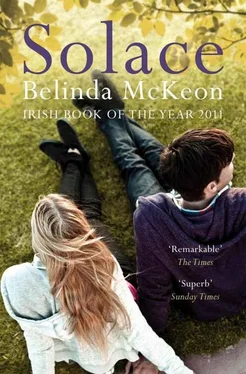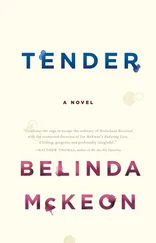Mark inhaled. Words seemed to slide behind walls and into formations, wrong formations, far away from him. He felt the heat of the fire furious against one cheek, against one whole side of his head, and he tried to lean away from it, but there was only so far he could lean. Worse still was that he found himself unwilling — unable — to look towards the door.
‘Don’t you ever think that, Mark?’ Irene said, and she leaned forward suddenly and reached a hand out to him. ‘Don’t you find yourself thinking that she’s going to come home?’
Mark stared at her hand. Something about it was familiar; something about it was wrong. It took him a moment, and then he saw it. The ring on her fourth finger. It was the ring he had given Joanne for Christmas, the first year. The silver ring, with the green stone; he had bought it from an antiques stall upstairs in the Westbury Mall. Joanne’s fingers had been swollen, from the pregnancy; she had not been able to wear it for a while, had not tried to wear it until after Aoife was born. Then she had worn it often; not every day, but often. She had been wearing it that day in the car. It must have been on her hand when she had been brought into the hospital; it must have been in her things afterwards. Her things, which had gone to her mother. Not to him. They had not been married. That was not how it was done.
‘Mark,’ Irene said, and stretched her hand closer to him. He took it. He did not squeeze it; he held it briefly with one hand, patted it with the other. Then he let it go. He stood. She looked at him in surprise, her eyes moist.
‘Is Frankie around?’ he said quickly.
Irene frowned. She sat back; she folded her hands in her lap again. ‘Frankie?’ she said, as though he had asked after someone she did not know.
‘I thought he might be in.’
Irene shook her head slowly, as if in sympathy at such a misguided notion. ‘No, Mark. Frankie has his own house now. I thought you knew that.’
‘No,’ Mark said. ‘I didn’t know that.’
‘I thought your father might have told you.’
‘No,’ Mark said again.
‘Well, Frankie built a house for himself on the farm over your lane,’ Irene went on. ‘Was he not building that when—’ She paused. ‘He must have been. I suppose you wouldn’t have noticed. I suppose you had enough on your mind.’
‘The farm over the lane?’ Mark said. ‘Tommy Burke’s old farm?’
‘Yes,’ Irene said, with a sigh. ‘Tommy’s old troublemaker. Frankie and his girlfriend have a new house on it now. They finished it over the summer. They’ve been living in it since September.’
‘And he’s farming it?’
‘Oh, yes, somehow,’ said Irene. ‘He’s stocking it himself. I don’t ask too many questions. And his girlfriend is pregnant. I don’t ask too many questions about that, either.’
‘You’ll have another grandchild,’ was all Mark could think of saying.
‘Another granddaughter, apparently,’ Irene said. ‘I told Frankie he should name her whatever he wants. He just told me to be quiet, that he was going to call her what he wanted to call her. I said, I just hope that’s what Michelle wants to call her, too.’ She smiled. ‘I used to despair of Frankie, you know. But I suppose he’s turning out all right. Eventually.’
The late news came on the television. The newsreader frowned and tilted her chin. There was a moment’s footage of some disaster, some brand-new nightmare a whole world away. Veiled women beseeched the camera with their hands, with their eyes. Beautiful children stared. The newsreader returned. Irene picked up the remote and switched the screen to black.
‘It’s terrible, what’s happening out there.’ She shook her head. ‘Wherever it is.’
‘I should go,’ Mark said, and he gestured towards the door. ‘It’s late.’
Irene stood, smoothing her dressing-gown. ‘Well, it was really lovely to see you. It was really lovely of you to call around.’
‘I just wanted to say hello.’
Irene looked at him for a moment. She did not smile. ‘You wanted something other than that, I think, Mark,’ she said. ‘But it was good to see you.’
She held her arms out to him. He went to her. She smelt of smoke from the fire and of something perfumed.
‘You go home and look after Aoife, now,’ she said hoarsely, into his ear. She rubbed the back of his shirt as vigorously as though she were washing it on a board. She gripped him by the shoulders and held him away from her. ‘None of this other rubbish matters, Mark,’ she said, and there were tears in her eyes. ‘Do you hear me?’
‘I hear you,’ Mark said, and she nodded as though he had said something very serious and very true.
‘Now go home to my granddaughter,’ she said, and she showed him to the door.
*
When he left Irene he drove the back way over the lane to Tommy Burke’s old farm. He parked a good distance from it. It was a night of a full moon and a hard frost. The shape of his breath moved ahead of him on the air. He concentrated on the sound of his footsteps until he saw the light of the new house ahead.
It was a dormer, built close to the lane, the upstairs windows tucked like nesting birds into the roof. A single car was parked outside; Frankie’s van was not there. One light was on upstairs and two downstairs. He could see the downstairs curtains were not drawn, and as he drew closer, he could see into the room; the side of a blue leather couch, a framed print — a Rothko — a large television screen. The woman was stretched out on the couch, her bare feet perched on its arm; her toenails were painted; her long fair hair was falling to the side. She was covered with a blanket. She put one hand to it, suddenly, and stroked it. She reached the other hand out towards a low table, towards a mug.
Mark walked around the darkened side of the house to the farmyard. Where Tommy Burke’s cramped outhouses had been stood two new sheds, their roofs sharply angled, their sides open to the yard. Round bales were stacked in the higher shed. Mark knew they were the bales he had made the previous summer, the bales he and his father had made. He looked at them and thought of the afternoon with the panicked girl from over the road, the fright about Aoife, missing from her cot, his father returning from Keogh’s, carrying her, proud as though he had won her in a game of cards.
*
Silence was what Tom was used to; he barely noticed that it had fallen on the house again. When the child cried out from upstairs, he looked to the radio, startled, before he realized what the noise was. He stared for a moment into the dark square of the window, seeing first the shape of the hayshed outside, then the reflection of his own stare, his chin leaning hard on his hand. He waited, and when she did not quieten, he climbed the stairs.
A small lamp was lit on the dresser and a bag was half unpacked on the bed. The room smelt of the electric heater and of something sour. The child was on her side in the cot, her face turned to the wall, the blanket tangled around her legs. Though she seemed to sense that someone had walked into the room, she did not look up. She kept wailing into the wall.
‘All right,’ Tom said, and something stilled in her, but then the crying started up harder and louder than before, and by the time he lifted her, sticky and damp, she was screaming, and leaning away from him so that it was hard to get a hold of her.
‘You’re all right,’ he said to her, but she continued to scream.
‘Your daddy’ll be back,’ he said to her, and at that moment she lifted a hand and brought it down — the sharp little fingers and the tiny edges of the nails — on his face.
‘No,’ he said, and she threw her weight backwards so suddenly that he came close to dropping her.
Читать дальше












